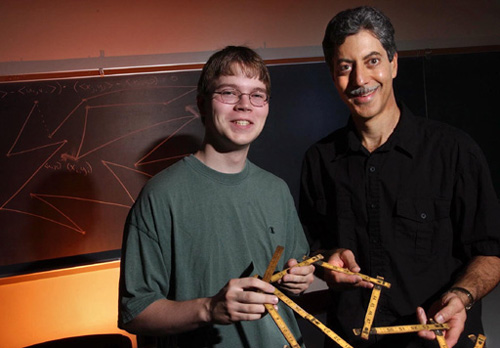Rob McEwen ’05 (Morgantown, Pa.) and Prince Chidyagwai ’05 (Marondera, Zimbabwe), both double majors in mathematics and computer science, are conducting a summer research project that may impact the field of robotics. They are using computational geometry to build on a mathematical puzzle known as the Carpenter’s Rule Problem.
The students are working with Gary Gordon, professor of mathematics, through the EXCEL Scholars program, in which students collaborate closely with faculty on research while earning a stipend.
“We’re working on the Carpenter’s Rule Problem, a two-dimensional problem dating from the 1970’s that was solved in 2000,” says Gordon. “Using research on an algorithm and a number of software packages, we’re trying to find some nice procedures to build on the research conducted to solve this problem.”
The Carpenter’s Rule Problem, named after carpenters’ measuring rules that unfold, asks the question, given a two-dimensional linkage system, which consists of a system of bars of various lengths, joined end to end in a cycle, can the system always be convexified? A figure is convex if any line joining points on the boundary of the figure stay within the interior of the figure or on its boundary.
“Professor Gordon is providing a great deal of guidance and support for our research project,” says McEwen. “Since he is very interested in geometry, he has a strong background in the subject and can convey his excitement for and knowledge of the field to us.”
The students are using a number of software programs, including Cinderella, a powerful drawing program for discrete and computational geometry.
“In order to learn more about the package, Rob actually took the initiative to get in touch with the software developers, who are based in Europe,” says Gordon.
“I’ve really enjoyed the project because computational geometry is a very dynamic field that links both my mathematical and computer science skills,” says Chidyagwai. “I’ve really learned a lot, especially in the area of structural rigidity as this is a fundamental aspect to the solution of this problem. I also find this very worth doing because the solution to the Carpenter’s Rule problem also has practical uses in protein folding techniques in biology and in designing robotic arm movements.”
For McEwen, hands-on research like EXCEL that extends beyond the normal classroom experience influenced his decision to attend Lafayette. The research has proven valuable for his academic career at Lafayette and future endeavors.
“As a student of computer science and math, working in computational geometry involves both of my fields. In terms of academic interests, the project falls right into place,” he says. “Work in this area is progressing rapidly, as it is a relatively new field. There are many interesting problems and areas to study. Since this is my first research project, it’s a bit daunting, but very cool at the same time. I’m excited to be here, to be challenged, and to be working in areas that don’t have concrete answers yet.
“There are not too many schools out there where undergraduates can engage in research projects, especially during their first year. Lafayette stands out in this respect. The faculty and staff go out of their way to provide a student-centered learning environment. I’ve met many great friends and had excellent opportunities. I’ve even had a chance to explore one of my other passions — music. That such a small school can provide these opportunities shows the dedication of faculty and administration to providing students with a nurturing and enjoyable experience.”
Adds Chidwagyai: “This has been an excellent learning experience. Working with Rob and Gary is wonderful.”
A graduate of Twin Valley High School, McEwen is a member of Lafayette’s Choir, Concert Band, Brass and Jazz Ensembles, and Pep Band. He also sings with the Chorduroys, Lafayette’s male a cappella group. Treasurer of Lafayette’s Association for Computing Machinery, McEwen updates the Chorduroys’ web page and received honorable mention in the Interdisciplinary Contest in Modeling.
Chidyagwai is program coordinator of Lafayette Caribbean and African Students Association, a mathematics peer tutor, and an active member of Lafayette Christian Fellowship.

Robert McEwen ’05, double major in mathematics and computer science, explored the Carpenter’s Rule Problem with Gary Gordon, professor of mathematics.
